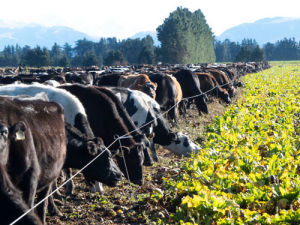TB slaughter levy for dairy jumps 75c/head
TB differential slaughter levy rates are changing with dairy animals paying $12.25/head, an increase of 75c from next month.
 Leaving critical source areas (CSAs) in winter forage paddocks ungrazed over winter helps prevent soil losses and water contamination.
Leaving critical source areas (CSAs) in winter forage paddocks ungrazed over winter helps prevent soil losses and water contamination.
Farmers are being reminded of the importance of leaving critical source areas in winter forage paddocks ungrazed over winter to prevent soil losses and water contamination.
Beef+Lamb New Zealand's Jane Chrystal says the interim results of a Landcare Trust/AgResearch study 'Understanding the impacts of sheep wintering' reinforced the value of leaving critical source areas (CSAs) ungrazed. The CSAs help trap and retain sediment and contaminant run-off resulting from winter grazing.
Under good practice winter grazing management, CSAs - which are low-lying areas within a paddock such as depressions, gullies and swales - should be fenced off and left ungrazed until spring or summer. Ideally, these areas should be left in grass, which acts as an ideal filter and sediment trap.
Chrystal - B+LNZ's principal science advisor, farm systems & environment - says early results from the trial comparing contaminant loss and sediment trapped on similar paddocks, one where the CSAs were grazed while the other was ungrazed, were consistent and significant.
While both paddocks were sown in kale and under a similar management regime of top-down grazing and two breaks of five days, there was a marked difference in the amount of suspended sediment in the water samples collected from each paddock after rainfall events.
Even before analysing the suspended sediment data, the scientists found visually striking evidence of the immediate effectiveness of the CSA on reducing the loss of soils from the paddocks.
The report states that "these visually striking differences provided an immediate indicator that the CSA was having a demonstrable impact on retaining soil and sediments eroded from the uphill portions of the paddock".
Subsequent analysis of the suspended sediments from all rainfall events throughout the winter of 2021 supported these results.
Chrystal explains that the trial, which started in the winter of 2020, is being run on a commercial farm in Waitahuna, West Otago. The goal is understanding the impacts of winter sheep grazing management on several environmental indicators.
"These results highlight the importance of keeping stock away from CSAs during winte and valuing these areas for their ability to prevent soil and contaminant losses."
She encourages all farmers growing winter forage crops to work through the Forage Cropping Management Plan, which is a chapter in B+LNZ's Farm Plan or available as a stand-alone resource.
"This plan will help farmers identify their risks and plan how they will make the best use of their winter feed resources, while protecting their environment and animal welfare."
Legal controls on the movement of fruits and vegetables are now in place in Auckland’s Mt Roskill suburb, says Biosecurity New Zealand Commissioner North Mike Inglis.
Arable growers worried that some weeds in their crops may have developed herbicide resistance can now get the suspected plants tested for free.
Fruit growers and exporters are worried following the discovery of a male Queensland fruit fly in Auckland this week.
Dairy prices have jumped in the overnight Global Dairy Trade (GDT) auction, breaking a five-month negative streak.
Alliance Group chief executive Willie Wiese is leaving the company after three years in the role.
A booklet produced in 2025 by the Rotoiti 15 trust, Department of Conservation and Scion – now part of the Bioeconomy Science Institute – aims to help people identify insect pests and diseases.

OPINION: The release of the Natural Environment Bill and Planning Bill to replace the Resource Management Act is a red-letter day…
OPINION: Federated Farmers has launched a new campaign, swapping ‘The Twelve Days of Christmas’ for ‘The Twelve Pests of Christmas’ to…